In the Northwest of England, taxi drivers are essential to the local transport system, helping passengers reach their destinations quickly and safely. Whether you are based in
Manchester, Wigan, Stockport, Liverpool, or any of the other bustling towns and cities in the region, obtaining a taxi badge is an important milestone for those wishing to work as professional drivers. However, before a taxi driver can start working, they must meet a number of health and safety standards. One of the key requirements is the taxi medical assessment, which ensures that drivers are fit to drive safely and responsibly.
In this article, we’ll explore the most applied-to councils for taxi badges in the Northwest and why the taxi medical assessment plays such a crucial role in passenger safety.
Councils with High Demand for Taxi Drivers in the Northwest:
- Manchester: As one of the largest cities in the UK with a bustling city center, large student population, and extensive transport links, Manchester has one of the highest demands for both private hire and hackney carriage drivers. The demand is especially high in areas like the city centre, the airport, and major transport hubs.
- Wolverhampton: Although in the West Midlands, Wolverhampton is often included in studies about taxi licensing because it’s a hub for private hire taxi licenses. Many drivers from outside of the city apply for their licenses here due to fewer
requirements and a quicker turnaround time for applications.
- Liverpool: Liverpool, with its large population and significant tourism sector, has a constant need for licensed taxi drivers. With Liverpool’s rich cultural scene, sports events, and thriving tourism industry, it has a large number of private hire and hackney carriage licenses issued each year.
- Wigan: This Greater Manchester borough has a growing demand for taxis,
particularly in suburban areas and areas with strong commuter traffic. Wigan is also home to many people who work in Manchester, so it sees high demand for local and airport transportation.
- Stockport: Stockport, another Greater Manchester borough, has a large number of taxi drivers operating in the area due to its proximity to Manchester and its busy shopping and transport hubs. Stockport’s medical assessment for drivers is in line with the national requirements.
- Trafford: As part of Greater Manchester, Trafford has a steady demand for private hire vehicles, particularly in areas like Altrincham, Sale, and Urmston. These areas
often have high numbers of licensed taxi drivers, given the local economy and transport needs.
- Rochdale, Oldham, Bury: These areas in Greater Manchester also have high numbers of applicants due to their proximity to Manchester city centre. Bury is
known for a relatively high number of hackney carriage applications, while Oldham and Rochdale have seen increasing numbers of private hire licenses issued in
recent years.
- Burnley and East Cheshire: These areas also have high taxi demand due to local economies, transport connections, and a growing population. Many applicants come from surrounding areas looking for licensing in these towns.
Why Taxi Medical Assessments Are Essential
In all the aforementioned councils, taxi medical assessments are a mandatory requirement for anyone applying for or renewing a taxi badge. These medical assessments are designed to ensure that drivers are physically and mentally capable of operating a vehicle safely,
without posing a risk to themselves, their passengers, or other road users. Key areas assessed during a taxi medical include:
- Vision and Hearing: Clear vision is essential for a taxi driver. Drivers must be able to read a number plate from 20 meters and hear road sounds like sirens and horns. Regular vision and hearing tests ensure drivers meet these essential criteria.
- Physical Health: Medical checks will also focus on a driver’s physical health, such as heart function, mobility, and general fitness. These factors are important, particularly since taxi drivers often spend long hours behind the wheel.
- Mental Health: Mental fitness is equally important. The medical assessment will check for conditions like depression, anxiety, or cognitive issues that might impact a driver’s ability to focus and react in challenging traffic situations.
How to Prepare for Your Taxi Medical Assessment
If you’re planning to apply for a taxi badge in councils like Rochdale, Manchester,
Stockport, or Liverpool, you’ll need to prepare for your medical assessment. Here are a few steps to take:
- Check Your Health: Make sure any existing conditions are well-managed. If you have high blood pressure, diabetes, or heart conditions, bring documentation showing that these are under control.
- Get an Eye Test: If you wear glasses or contact lenses, make sure your prescription is up to date. Also, ensure that you can meet the requirement of reading a number plate from 20 meters away.
- Prepare Medical Records: This is in the form of a GP medical summary, which can be obtained by requesting it from your doctor. Please be aware that while some GP surgeries can provide the medical record instantly, others may take up to four weeks to send it to you.
- Stay Fit: Maintaining good physical fitness will make your medical assessment smoother, as physical health is a major factor in the evaluation.
Why Choose Dr4D4 LTD for Your Taxi Medical Assessment
Doctor for D4 LTD, understands that the taxi medical assessment is an important part of becoming a licensed driver. Their certified doctors are experienced in conducting Group 2 medicals for taxi drivers across the UK, including regions like Manchester, Bury,
Rochdale, Wigan, Stockport, and Trafford.
The process is simple, efficient, and stress-free, ensuring you’re fully prepared to meet your council’s licensing requirements. They have a team who is ready to help with quick
appointments and expert advice.

